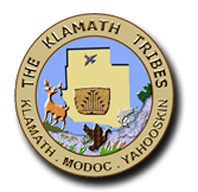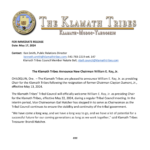CHILOQUIN, Ore. – Although it should never have required a court order to force the Bureau of Reclamation to live up to its Endangered Species Act obligations to the c’waam and koptu, the Klamath Tribes feel grateful for the strength and clarity of U.S. Magistrate Judge Mark D. Clarke’s September 11, 2023 ruling.
Unambiguous in his finding, Judge Clarke said, “Reclamation’s ESA obligations to the [c’waam and koptu] take precedence over any water allocation to Project irrigators” and that “the clear purpose of the ESA is to halt and reverse the trend toward species extinction.” Judge Clarke therefore agreed with the Klamath Tribes that the Bureau of Reclamation broke the law when it allocated water to irrigators in 2022. The bureau did this despite Upper Klamath Lake not meeting minimum elevations necessary for successful c’waam and koptu spawning and rearing.
“I hope that this decision will finally convince the Bureau of Reclamation, the US Fish and Wildlife Service’s national leadership, and all Project irrigators and other Klamath Basin water users that the way forward for all of us is to restore the form and function of our complex ecosystem,” said Tribal Chairman Clayton Dumont Jr. “There is no sustainable way forward that does not involve healing the water, land, and forests that all of our communities depend on.”
“The Klamath Tribes stand ready to put our substantial understanding of this place that has been our home for thousands of years to work on behalf of all the living things residing here,” Chairman Dumont continued. “But let there be no mistake. The c’waam and koptu are existentially important to the Tribes and are hovering on the verge of extinction. The Tribes will continue to do everything in our power to ensure that such a cataclysm does not occur.”
About The Klamath Tribes
The Klamath Tribes primary mission is to “protect, preserve and enhance the spiritual, cultural and physical values and resources of the Klamath, Modoc and Yahooskin Peoples by maintaining the customs of our ancestors.” The heart of Tribal life is centered in the area of Chiloquin, Oregon and includes 12 Departments, Health Clinic, Childcare Center, Tribal Court, goos oLgi gowa Center, Research Station, and three tribal enterprises. The Klamath Tribes’ 12 departments facilitate service delivery to multiple aspects of tribal life, including health and fitness, education, economic development, social services, cultural preservation, natural resource protection and more. For more information visit https://klamathtribes.org/.
###





